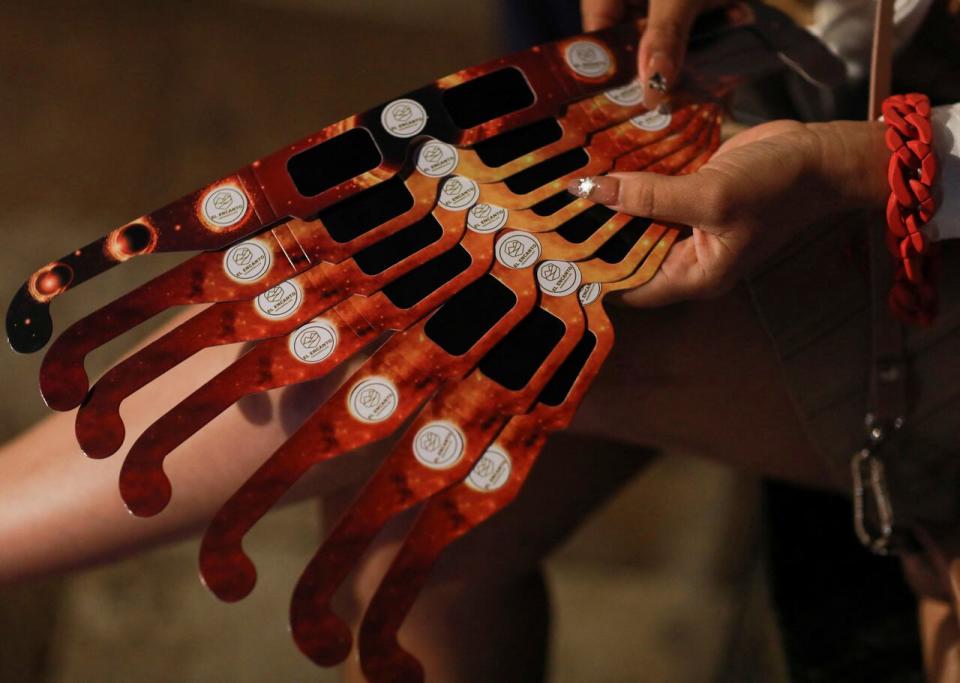As New Brunswickers prepare to witness the solar eclipse, CBC News will have on the ground coverage from different parts of the province along the eclipse’s path of totality.
A solar eclipse occurs when the moon passes in front of the sun. And when the moon completely covers the sun, it is considered a total solar eclipse.
Fredericton, Woodstock, Miramichi and Carleton North are among the areas of New Brunswick on the path of totality.
Some other regions, including Moncton, will witness a deep partial eclipse with nearly total coverage of the sun.
Lucky weather
Against the odds, Monday’s weather is expected to be mostly clear and eclipse-viewing friendly.
CBC meteorologist Ryan Snodden said the Maritimes will be one of the best places in North America to view the solar eclipse, with warm temperatures and mostly clear skies.
Overall, temperatures are expected to be mild, ranging from 10 C to 14 C in most of New Brunswick, cooler closer to the shore.
Some cloud will move southward into the province this afternoon, but Snodden said its impact will likely be minimal.
“It’s certainly not going to be overcast, it’s certainly not going to be mostly cloudy.”
The winds will be northwest, 20 km/h gusting to 40 km/h, making temperatures feel a little bit cooler.
Harnessing eclipse momentum
For Stephane Picard, the eclipse as an opportunity to kickstart New Brunswick’s astro-tourism industry.
The Quispamsis man organized the first conference for astronomy tourism, called Astronomy East, on the weekend. The conference and trade show in Miramichi had astrophotographers, stargazers and dark-sky advocates.
Picard said the people coming to watch the eclipse from elsewhere are not used to seeing the stars that most New Brunswickers see every night.
He said about 80 per cent of Americans, and 60 per cent of Canadians, are unable to see the milky way where they live.

As visitors stream in to watch the total solar eclipse, they will also witness the dark skies and numerous stars New Brunwick has to offer. (Henry Romero/Reuters)
“In populated areas, they’re missing out on the grandest show in the universe.”
For this reason, he said, the New Brunswick sky is not something to be taken for granted.
Picard recently quit his day job and is focusing on working with communities to develop dark-sky sites, light pollution mitigation, and including amateur astronomy and stargazing in their tourism strategies.
“New Brunswick has tons of beautiful areas to go, lots to do during the day,” he said. “What do you do with these visitors? Well, now at night there’s something that we have,” he said.
“The weather doesn’t always co-operate, but when it does, we have some of the best dark-sky sites in all of Canada.”
Just when it happens
According to the Royal Astronomical Society of Canada, the partial eclipse will begin at around 3:22 p.m. for western regions of the province and between 3:25 p.m. and 3:26 p.m. for eastern regions.
Total darkness will occur a little over an hour later. For the western regions along the path of totality, the starting time is 4:32 p.m., with the locations at the end of the path of totality in New Brunswick entering full darkness at around 4:34 to 4:36 p.m.
It could last anywhere from a little more than a minute to around four minutes.
The entire eclipse will have ended by around 4:36 p.m. in New Brunswick.
How to follow the eclipse with CBC New Brunswick
CBC New will be in several locations bringing you the latest on the eclipse, need-to-know information and interviews with people out to experience the phenomenon.
Starting off the day, the three Information Morning shows will be joining forces for a provincewide remote broadcast jointly hosted from Miramichi, Fredericton and Florenceville-Bristol, in Carleton North.
Reporters will be on the ground in those three locations, and in Moncton, where festivities will be taking place to celebrate the eclipse.
Tune into CBC Radio 1 beginning at 6 a.m. to hear from people watching the eclipse and a host of others, including an astrophotographer and an optometrist.
Continue checking the CBC New Brunswick website throughout the day for up-to-date video, livestreams and stories.
Crédito: Link de origem





Comentários estão fechados.